BTR powers new energy industry with battery material solutions
Writer: Windy Shao | Editor: Zhang Zhiqing | From: Original | Updated: 2025-04-25
Video by Xu Shuntian
Shenzhen is committed to building a next-generation, world-class automobile city, which is evident in production figures. With 2.93 million new energy vehicles (NEVs) produced in Shenzhen in 2024 — 23% of China’s total output — the city maintained its position as the nation’s top NEV producer for the second consecutive year.
Driven by proactive government policies and market demand, Shenzhen’s NEV industry chain is continuously improving, with enterprises active in lithium battery materials, battery manufacturing, electric control systems, vehicle manufacturing, and other supporting fields.
Top anode material supplier
Guangming District-based BTR New Material Group Co. Ltd. — founded in August 2000 and affiliated with the listed China Bao’an Group Co. Ltd. — is at the forefront of the city’s new energy revolution.
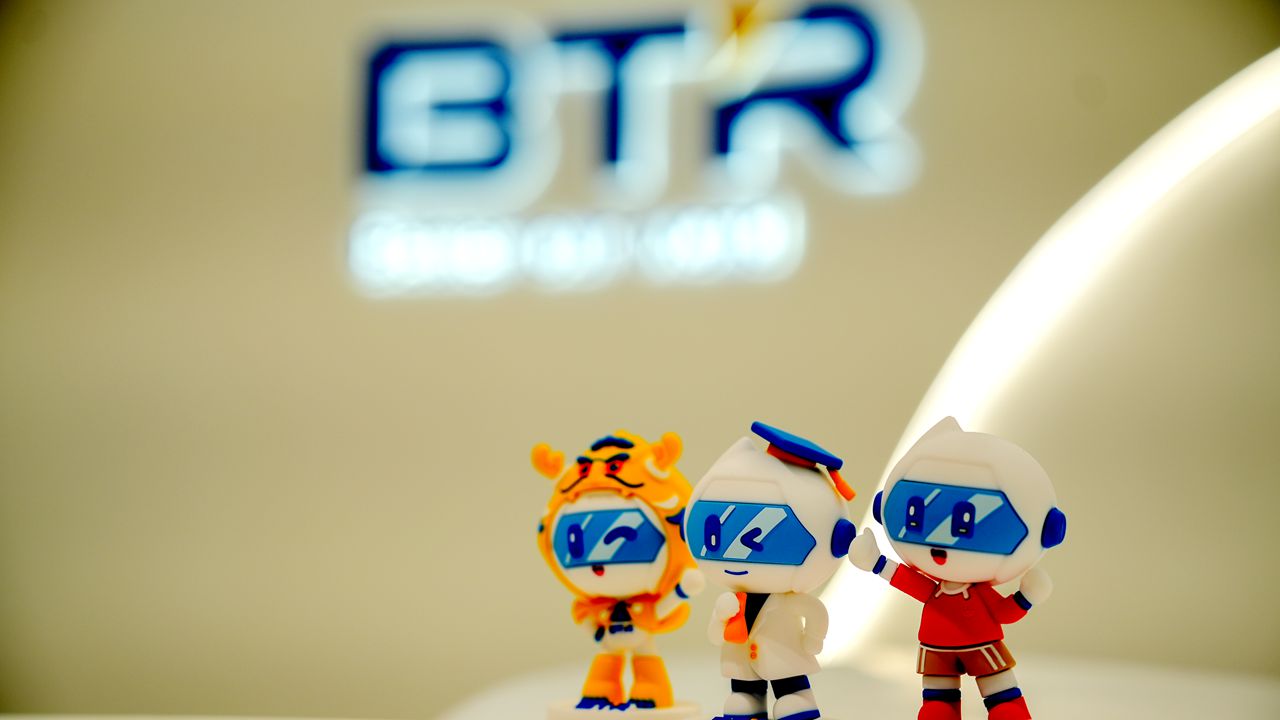
BTR mascots are seen at the company's exhibition hall. Photos by Lin Jianpin except otherwise stated
BTR specializes in lithium-ion battery anode materials, cathode materials, and advanced new materials — essential components for the batteries used in NEVs, consumer electronics, and energy storage systems. Batteries are regarded as the heart of NEVs and account for about 40% of their total cost.
Holding the title of the world’s largest anode material supplier for 15 consecutive years since 2010, BTR had captured 22% of the global anode material market in 2024 with an annual production capacity of 575,000 tons.
BTR leads the world in shipments of silicon-based anode materials, having been one of the first companies in China to mass-produce them. Furthermore, its shipments of high-nickel ternary cathode materials have consistently placed it among China’s leading suppliers in recent years.
Corporate culture of innovation
BTR’s current CEO, Huang Youyuan, recently sat down for an interview with Shenzhen Daily and ChinaEU to discuss the company’s past trajectory, corporate culture, challenges, and future plans.
Reflecting on his journey with the company, Huang said, “I joined BTR in 2007 when it was still a small company. The chairman at the time invited me to discuss how to develop the business in the future. I think if you want to grow up, you need to look for something different — that means you need innovation.“
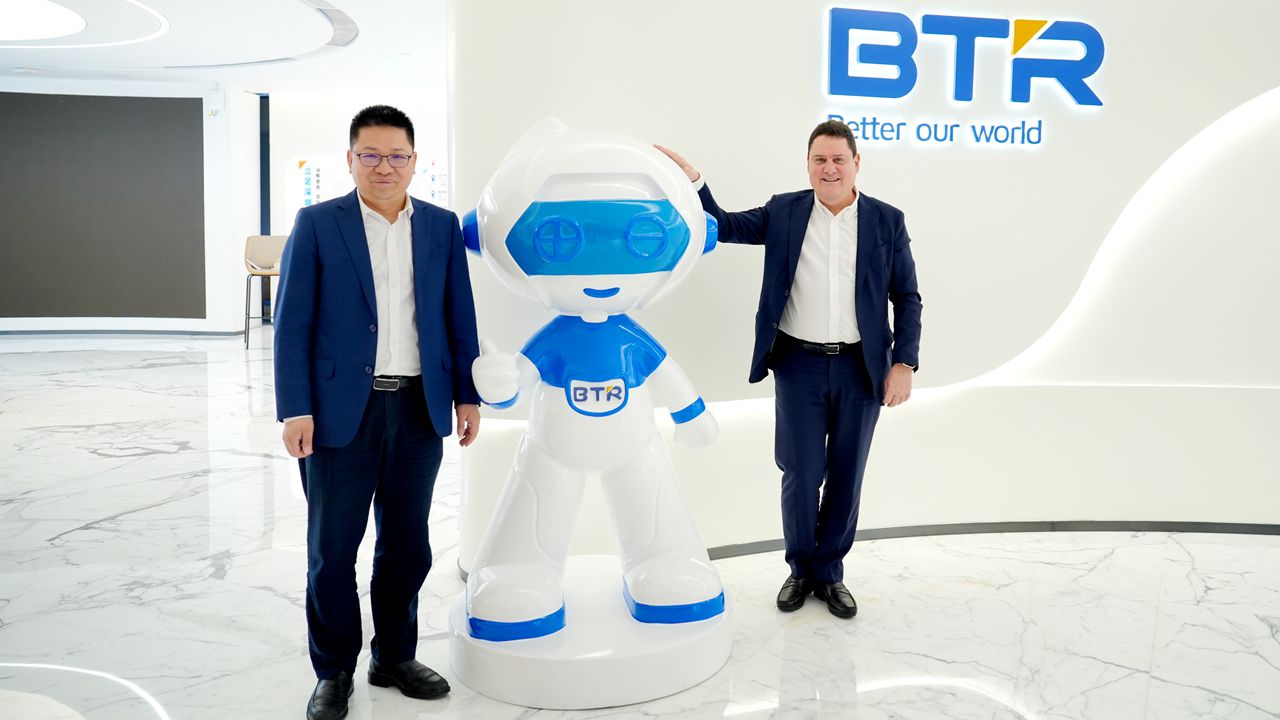
Huang Youyuan (L), CEO of BTR, poses for a photo with Luigi Gambardella, president of ChinaEU, at the company’s exhibition hall in Guangming District.
For BTR, innovation came in the form of securing a comparative advantage in the market. “No one was producing natural graphite anode materials at the time, and China’s natural graphite resources were excellent. We seized that opportunity, and BTR grew rapidly,” he said.
Stressing the company’s strong commitment to research and development (R&D), he stated, “From the start, we invested heavily in R&D. I helped design the R&D system then.”
Over the years, BTR has built an internationally leading research platform. Its Central Research Institute, established in 2010 and recently upgraded with state-of-the-art equipment and a professional team, spearheads innovations in lithium-ion battery materials.
These efforts had yielded over 690 domestic and international patents by the end of 2024. Furthermore, the company has led or participated in the development of 49 international, industry, and group standards related to new energy materials.
Among its many honors, BTR’s “Lithium-ion Battery Anode Material Industry Standardization Pilot” program has been recognized as a key standardization project by Guangdong Province. The company boasts academician and postdoctoral workstations, a National Enterprise Technology Center, and multiple CNAS laboratory certifications.
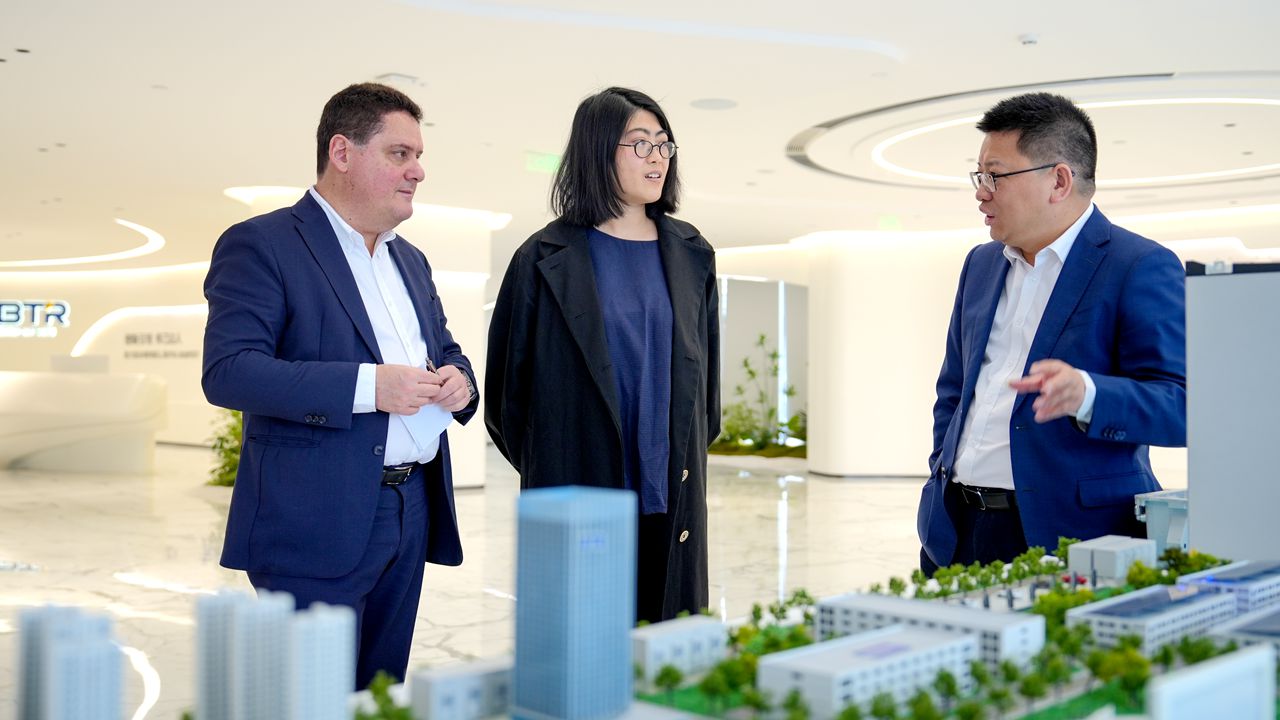
Huang Youyuan (R), CEO of BTR, talks with Luigi Gambardella (L), president of ChinaEU, during an interview jointly conducted by Shenzhen Daily and ChinaEU.
Beyond R&D, BTR fosters close partnerships with leading domestic and international lithium-ion battery manufacturers. This customer-centric approach enables BTR to continuously anticipate market needs, develop tailored products, and maintain a leading market position amid fierce competition.
Huang explained, “Innovation comes from meeting customer demands. We listen closely to what our customers need and develop products accordingly. We can not stay in a comfort zone — we must be ready for the future.”
He added, “Most of our top management comes from technical backgrounds. BTR is a company managed by experts who prioritize technology and innovation.”
Global production
With a comprehensive production and R&D network, BTR is executing an ambitious global strategy that supports the fast-growing demands of new energy markets worldwide.
While the company’s operations are centered in Shenzhen and extend to more than 20 production bases across China, its global strategy has entailed establishing production bases in Indonesia and Morocco, with branch and subsidiary companies in Japan, South Korea, and Europe.
Huang, sharing insights into the company’s global ambitions, explained, “We wanted to become an international company starting in 2018, when BTR already had a strong market share. Most of our customers are foreign enterprises. To truly globalize, we realized we needed to localize production. Indonesia became our first overseas manufacturing base.”
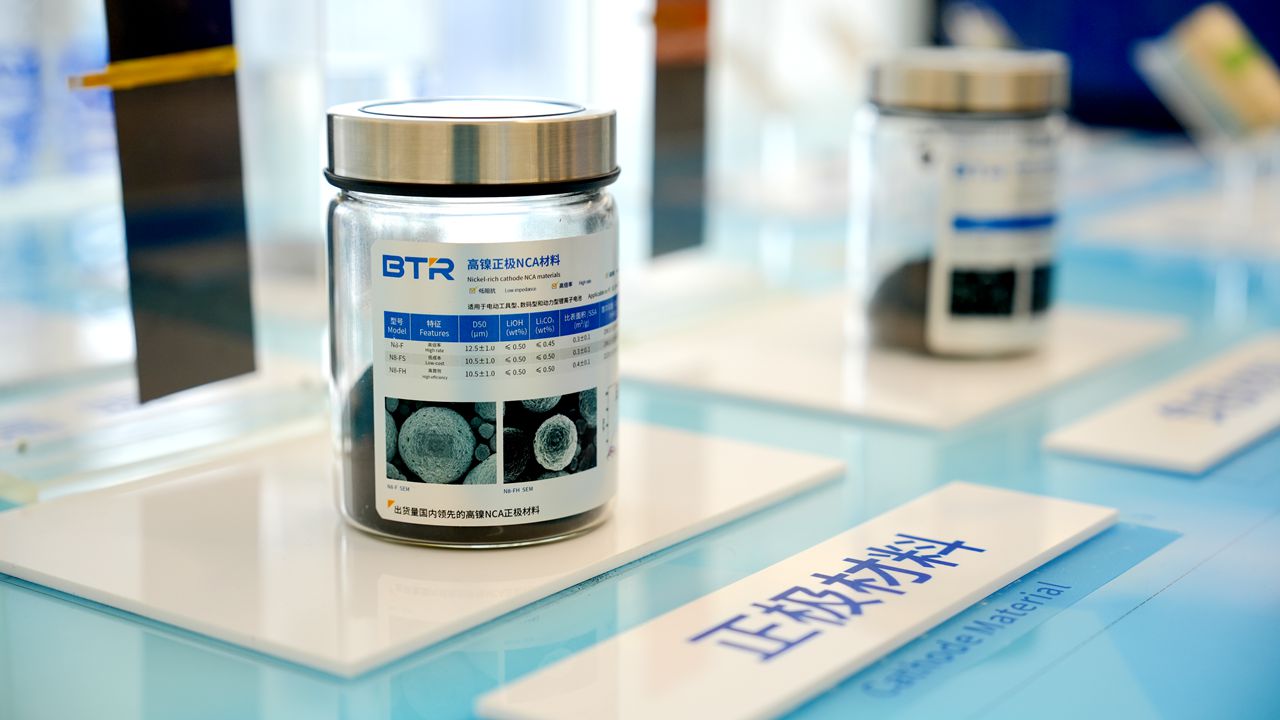
Battery material produced by BTR.
In August 2024, BTR officially commissioned its integrated anode material production project in Indonesia, which is designed with an annual production capacity of 160,000 tons. The project’s first phase, with a capacity of 80,000 tons, has already started production.
Currently, in Morocco, the company is constructing a lithium battery cathode materials plant with an annual capacity of 50,000 tons and plans to build another integrated anode material production facility in the country with a 60,000-ton capacity to bolster its overseas market presence.
He acknowledged the challenges of this global expansion, saying, “Language and culture were the first hurdles. As a Chinese company, adapting to local culture is essential. When we started building the Indonesian factory in 2023, some customers doubted we could complete it in one year. But in August 2024, the factory was set up and running.”
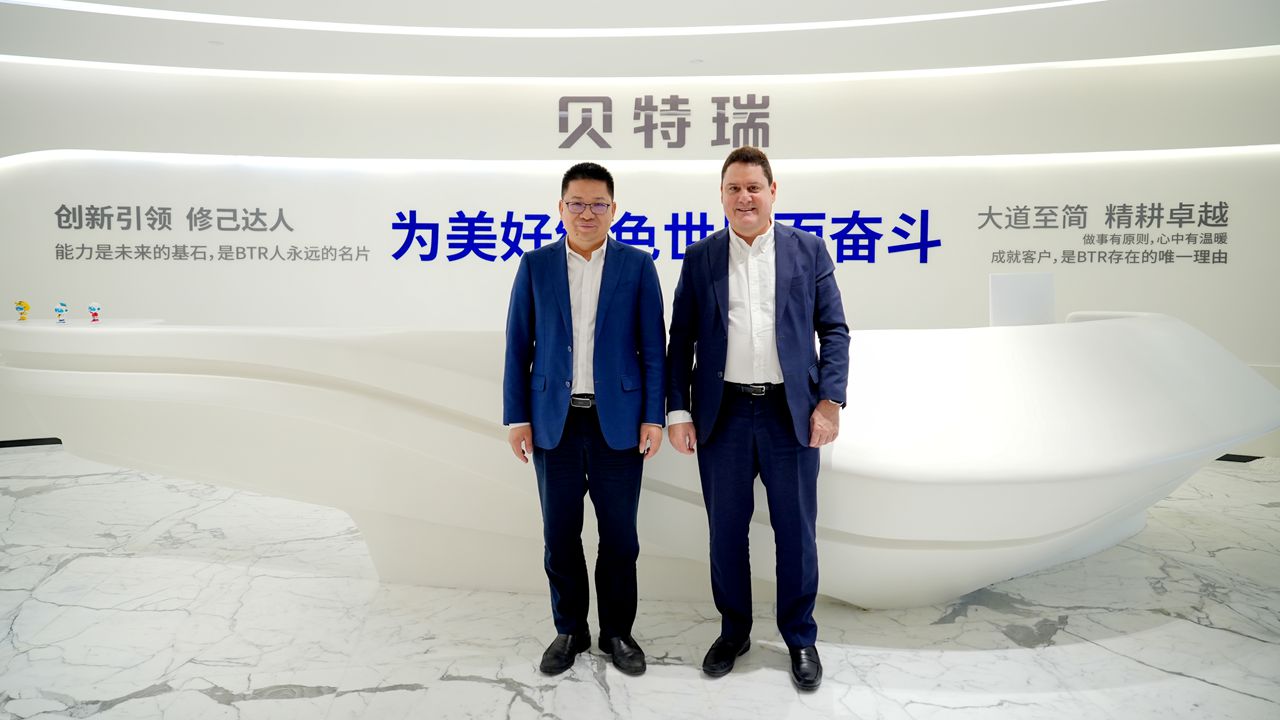
Huang Youyuan (L), CEO of BTR, poses for a photo with Luigi Gambardella, president of ChinaEU, at the company in Guangming District.
Huang emphasized the importance of local factories serving local customers, saying, “To succeed internationally, you must be where your customers are.”
When asked about Europe’s industrial ecosystem, Huang said, “European markets need to build supply chains, and cooperation with Chinese companies like BTR is key. Building the entire supply chain independently is difficult. Many of our customers are European, and joint ventures will likely be the future. Europe must shift its mindset, recognizing this is a new industry distinct from traditional manufacturing.”
Sustainable growth strategy
BTR adheres to sustainable development concepts, promoting environmentally friendly and sustainable growth through continuous technological innovation and environmental management practices.
Huang explained, “Our goal is to develop safer battery technologies, offering complete material solutions for the next generation of batteries. Achieving safer batteries requires naturalized materials, which we provide.”
Stressing the critical role of recycling in their strategy and corporate philosophy, he said, “I think recycling technology is very important for the future. Our approach ensures batteries are designed to be easily recyclable, minimizing environmental harm during the process. The focus is not just profit but sustainability.”
Open, inclusive international team
With an increasingly global footprint, BTR employs staff from Japan, South Korea, Indonesia, Morocco, and other countries. Strategies for creating an open, inclusive corporate environment are essential in this changing context.
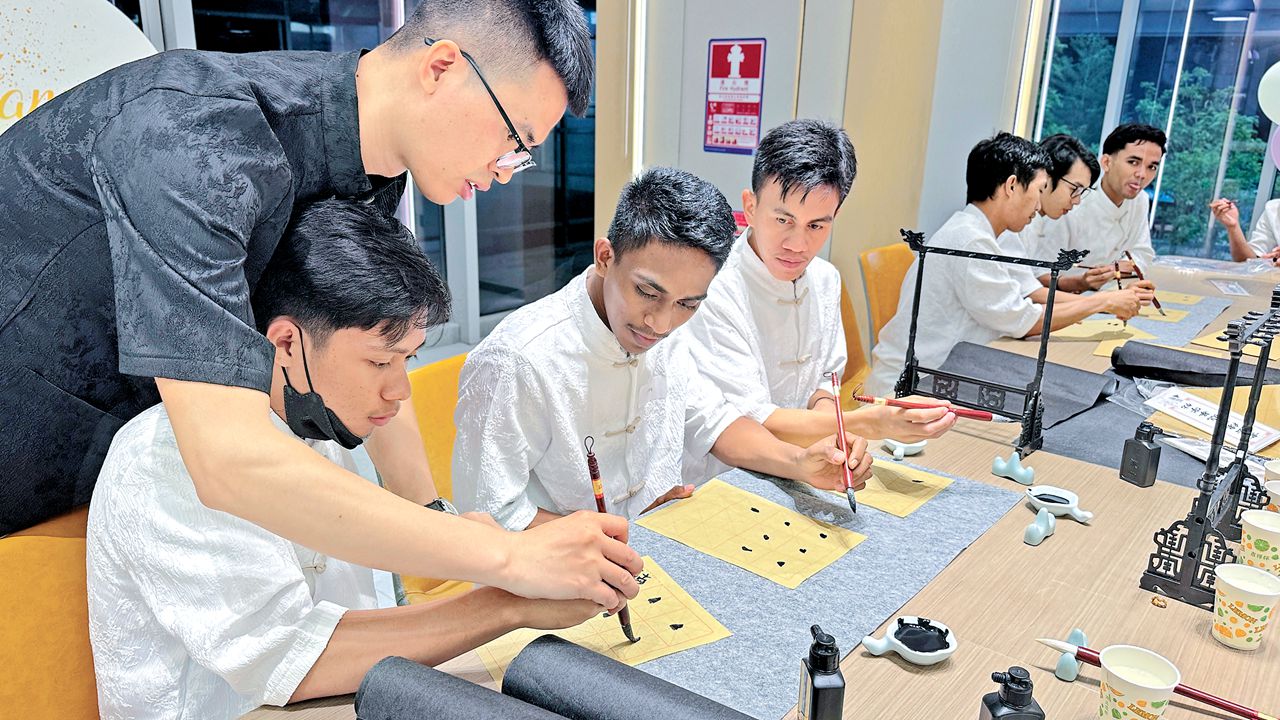
A Chinese staffer teaches BTR’s Indonesian employees Chinese calligraphy. Courtesy of BTR
Emphasizing the importance of cultural respect and integration, Huang explained the company’s proactive culture. “In Indonesia, for example, we encourage Chinese staff to learn the local language. Our Indonesia factory CEO learned the local language well enough to communicate efficiently within six months.”
Huang added, “Good relationships between Chinese and local teams help create a happy, productive work environment. At every visit to our foreign branches, I meet local managers to discuss work, which strengthens trust and cooperation.”
SZ’s unique ecosystem
Huang pointed to Shenzhen’s unique ecosystem as an important component of BTR’s success. “Shenzhen is a young, open city. Government policies and the business environment are helpful for a company’s development. It’s an ideal place for attracting both local and international talent, which is crucial when we expand globally.”
Specifically highlighting government support, he noted, “They create the ecosystem, and they help companies work in an ecosystem that favors the business without interfering in their management.”